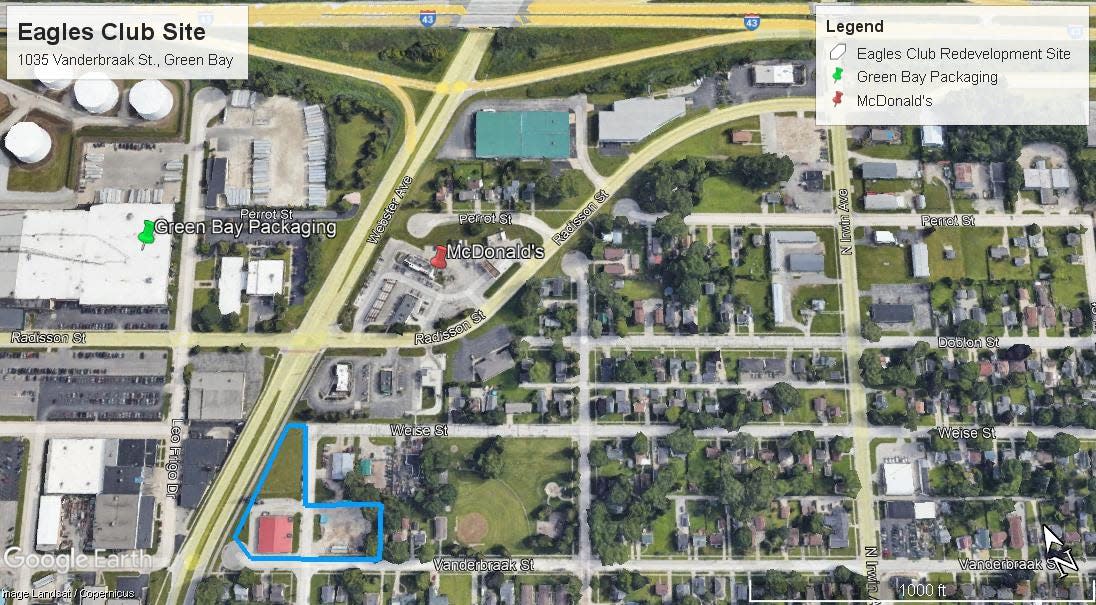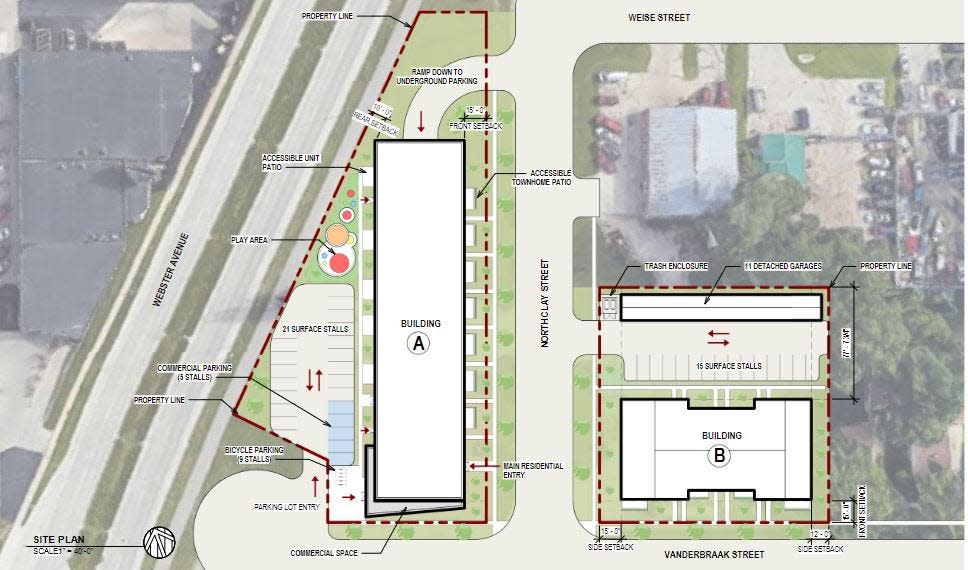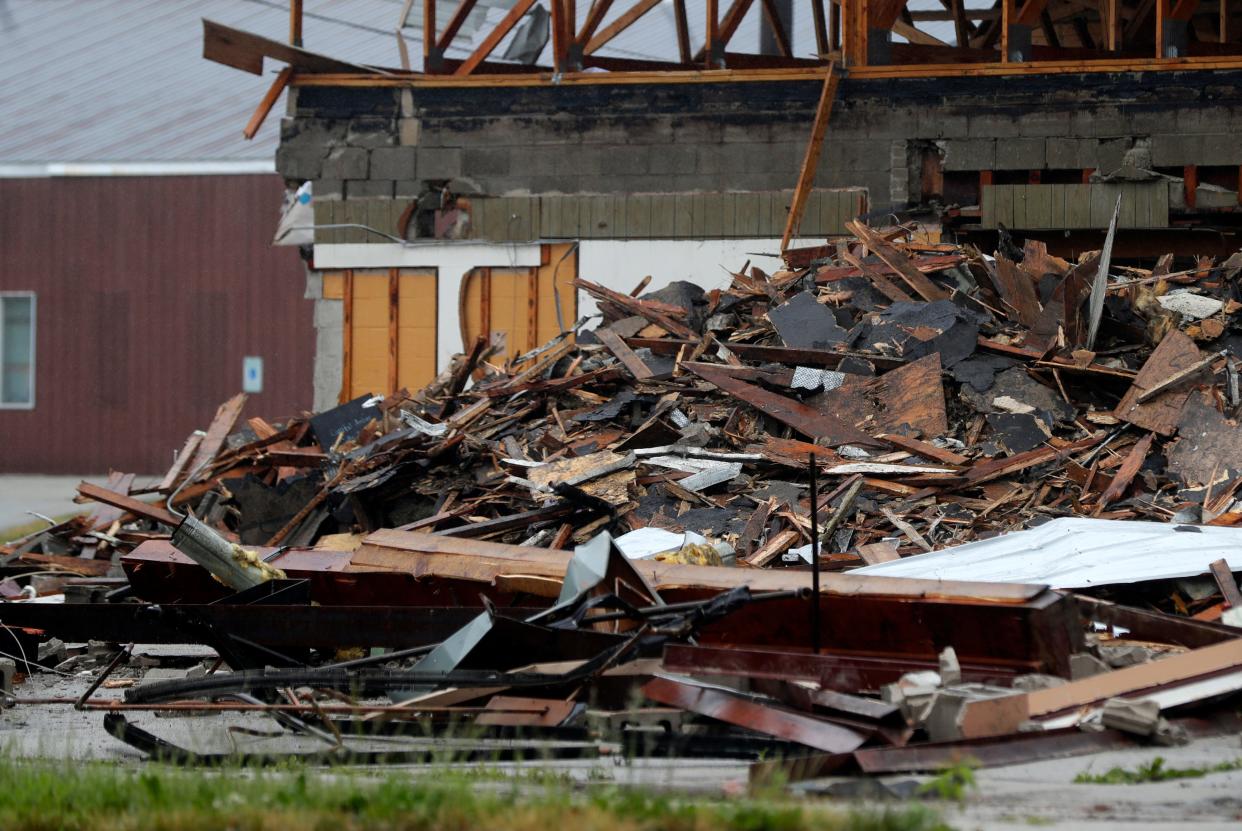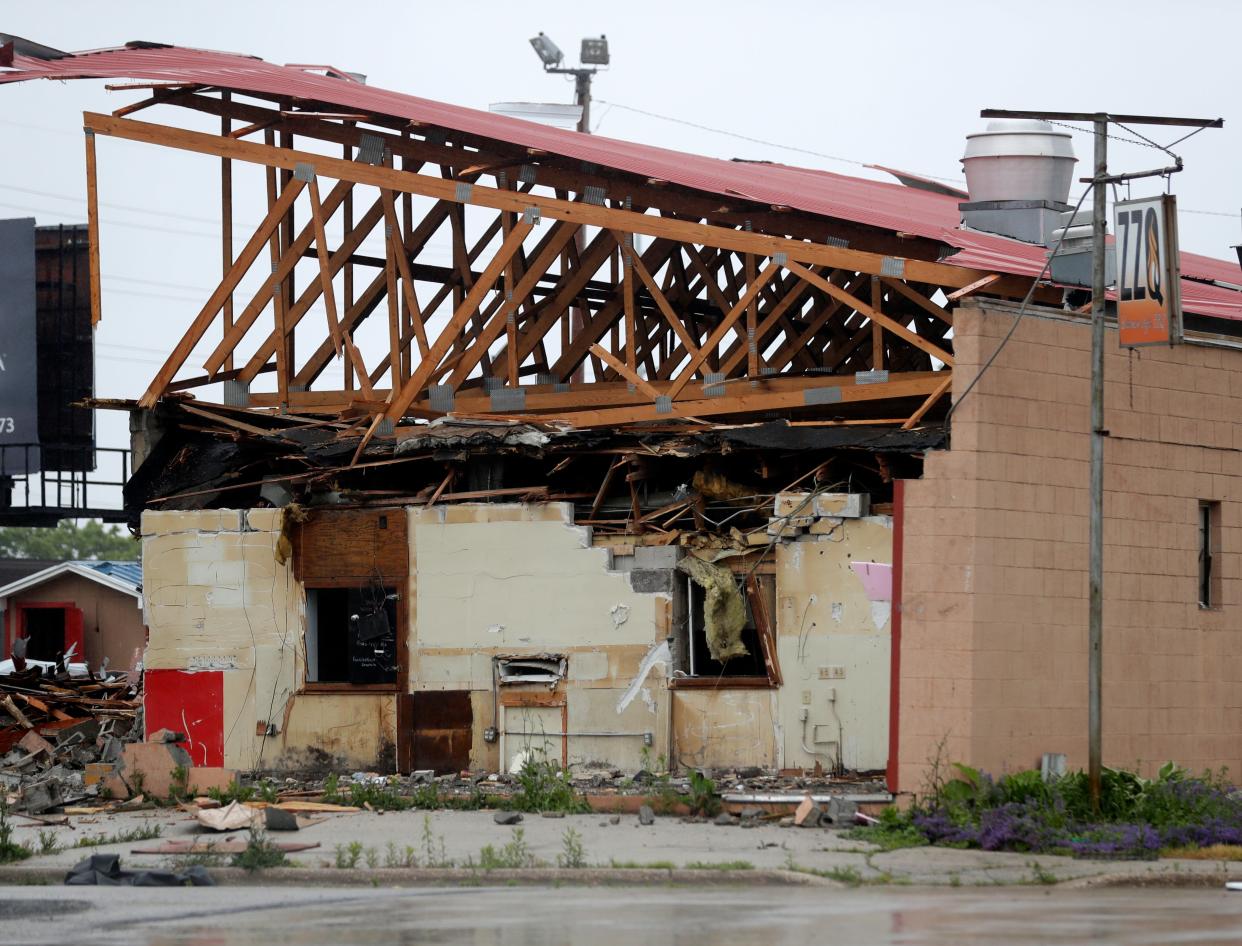Plan would convert former Eagles Club site in Green Bay into 52 affordable apartments
GREEN BAY - A pair of Wisconsin developers want to build 52 affordable housing units on the site of the Eagles Club, a storied Green Bay venue known for pancake breakfasts and punk shows alike.
Milwaukee-based Danna Capital and Madison-based Horizon Development Group have proposed a $14.8 million, two-building project that would add one-, two- and three-bedroom apartments on Green Bay's north side at rents affordable to families that earn $30,000 to $76,400 each year.
The city of Green Bay bought the Eagles Club in December 2020 from a bank, which previously bought it at a sheriff's sale. After efforts to convert it to a community center failed, the city hired contractors to demolish the building at 1035 Vanderbraak St. and sent out a request for affordable housing proposals for the the site and other city-owned properties across Clay Street.

Danna and Horizon in October submitted the lone proposal for the site. The project, called The Ashwood at Green Bay, includes a three-story, 36-unit apartment building along Webster Avenue and 16 two-story townhouse apartments on the property across Clay Street.
Here's what we know so far. This information could change as the two development companies further explore the project plans.

The Ashwood would require a variety of financial assistance to build
Danna and Horizon expect the project would cost about $14.8 million to build and because of the lower rents charged, would only have an assessed property value of $3.5 million. They indicate they will need government assistance to finance it.
The team wants the city to sell the site to it for $1 with requests for $500,000 in HOME funds, $750,000 in American Rescue Plan Act funds and $431,000 via a tax incremental financing district, or TIF. A TIF uses property taxes generated from new development to pay off things like blight removal, infrastructure improvements and development incentives, all of which can help spur development of an idle site.
The developers plan to apply for $9.2 million in state and federal low income housing tax credits administered by the Wisconsin Housing and Economic Development Authority (WHEDA). The developers can sell the state and federal tax credits, use the proceeds to finance construction, and offer lower rents to tenants. Those tax credits will be awarded in spring 2024.
The funding sources list also includes a $2.4 million first mortgage.
The project does face a $514,000 financing gap that still needs to be filled. Housing developers continue to struggle with such funding gaps as interest rates remain high.
More on housing: Started, stalled, or soon? Here are 8 updates on Green Bay housing developments
Plans include public art, community spaces, focus on accessibility
The two-building plan includes a mix of uses, amenities and 96 total parking stalls which are split between underground parking, surface parking and on-site garages.
The project plans call for 44 of the units to be fully "visitable" by people with disabilities and a couple units will comply with all Americans with Disabilities Act accessibility standards. That means the units will have features like an accessible bathroom, zero-step entrances, lower counters, lower sinks and wider doorways that make it easier for people with disabilities, and their visitors, to enjoy the full use of their apartment.
The three-story apartment building would also include first-floor spaces for a community service organization, a fitness center, leasing offices and a resident community room.
Luke Samalya, president of Danna Capital, on Tuesday told the Green Bay Redevelopment Authority that the site plans also include walkways, bike racks, public art and a play area.
"This will be a cool project," Samalya said.

Milwaukee and Madison developers have six months to refine, finance plans
Green Bay's Redevelopment Authority on Tuesday afternoon approved Danna and Horizon's request for a six-month planning option for the site. A planning option, in essence, gives the developers a right to buy the property from the city.
The developers will use the time to further refine the project plan, determine if it can find the necessary financing and work toward a development agreement with the city.
Matt Schueller, RDA vice chair, said he liked the location and the potential it has for collaboration with Paul's Pantry, which is located across North Webster Avenue from the Eagles Club site.
When would construction start and finish?
A tentative project timeline indicates the developers would find out if they receive tax credits in spring 2024.
From there, they would look to complete financing by fall 2024 and start construction shortly after they complete their purchase of the land in October 2024. Marketing of the site's units would begin in July 2025.
Construction would be complete by October 2025.

Your household income determines if you qualify for housing ...
Danna and Horizon's submission to the city indicates it would set aside all of the units for households that earn 30%, 50%, 60% or 80% of the area's median income, also known as extremely low (30%), very low (50%) and low (80%) income limits.
Here are the current income limits for the Green Bay metro area, according to the U.S. Department of Housing and Urban Development:
An extremely low income household of one earns $20,100 while a household of four earns $30,000.
A very low income household of one earns $33,450 while a household of four earns up to $47,750.
A low income household of one earns $53,500 while a household of four earns up to $76,400.
... and what you would pay for rent
The proposal also includes a tentative rent schedule for tenants based on their income qualifications.
For one-bedroom units, the projected rents range from $380 to $1,200.
For two-bedroom units, the projected rents range from $455 to $1,435.
For three-bedroom units, the projected rents range from $520 to $1,665.
The Ashwood would not be complete until 2025, but would add housing families with some of the lowest household incomes in the region can afford. The Green Bay area needs to add thousands more affordable and market-rate apartments and owner-occupied homes by 2040 in order to keep up with population growth projections.
Green Bay to study Community Land Trust as option to address need for affordable houses
Projects like The Ashwood help address rental demand, but the region also needs to add affordable owner-occupied homes.
This is no small challenge right now when the labor, material, land and permitting costs to build a new 1,500-square-foot starter home easily exceed $300,000.
To that end, the RDA on Tuesday approved spending $65,000 to study creation of a Community Land Trust to build permanently affordable owner-occupied housing throughout the city.
A Community Land Trust would buy or receive donated properties throughout the city, build owner-occupied homes on the land, and sell the homes — but not the land — to buyers at an affordable price. Buyers would agree that when they want to sell the home, they either will sell it back to the trust or to another low-income buyer at a price that is below what a similar home might sell for on the open market.
Contact Jeff Bollier at (920) 431-8387 or jbollier@gannett.com. Follow him on Twitter at @JeffBollier.
This article originally appeared on Green Bay Press-Gazette: Affordable housing pitched for former Eagles Club site in Green Bay
